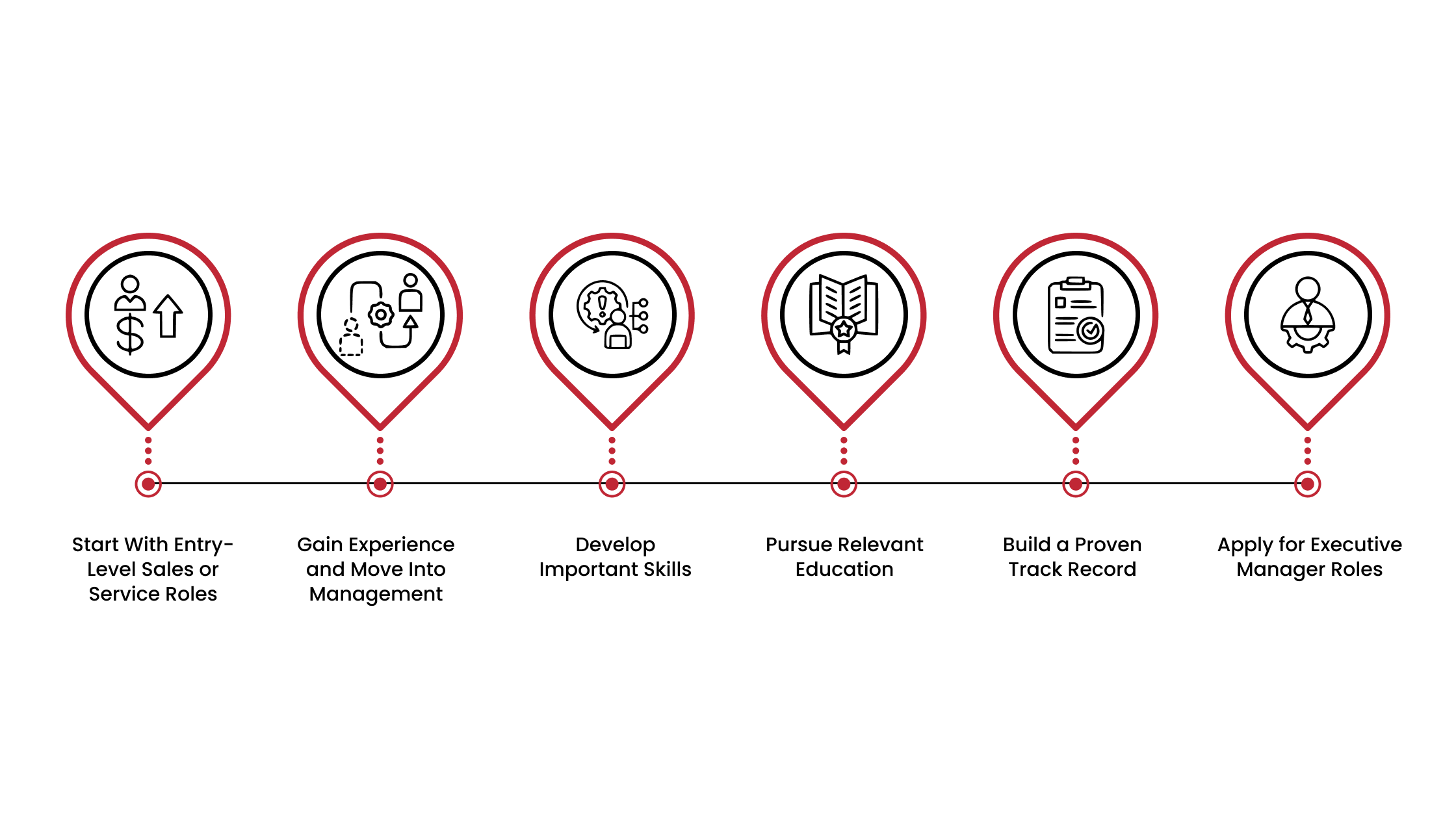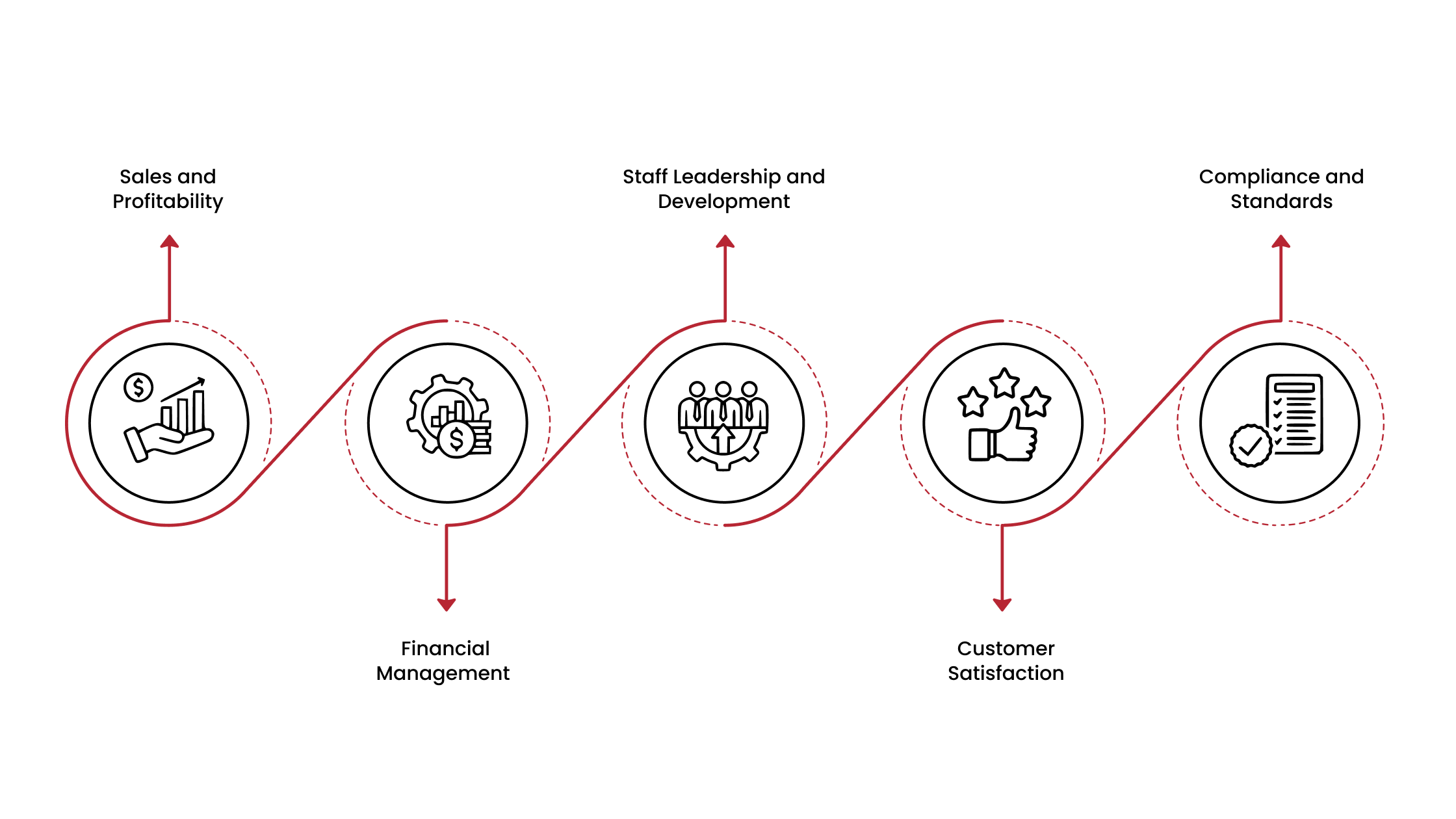What is an Executive Manager at a Car Dealership: A Guide

If you’re passionate about cars, sales, and leadership, you might wonder what an executive manager at a car dealership is and how to become one. An executive manager is not just any employee.
Here’s a quick look at what the role is and isn’t:
What is it about
- A high-impact leadership role overseeing sales, service, staffing, and profitability.
- The person is accountable for aligning daily operations with long-term dealership goals.
What it’s not!
- A behind-the-scenes desk job or a single-department manager.
- Someone who only steps in when there’s a problem.
In fact, over 17,000 new car dealerships operate in the U.S., each needing skilled executive managers to keep the business running smoothly.
In this blog, we’ll break down exactly what an executive manager at a car dealership is, the path to reach this position, the qualifications you’ll need, and the skills that will help you excel. Whether you’re already working in the auto industry or considering a career shift, this detailed roadmap can help you plan your way up to the executive manager’s chair.
What is an Executive Manager at a Car Dealership?
An executive manager is the top leadership position that oversees the entire dealership’s daily operations. Think of them as the general manager or dealership director. Their primary role is to ensure that every department is aligned toward common goals.
An executive manager’s responsibilities usually cover:
- Overseeing sales, service, parts, and finance departments.
- Setting sales targets and ensuring revenue growth.
- Managing staff performance and training.
- Maintaining customer satisfaction and dealer reputation.
- Reporting to dealership owners or corporate headquarters.
Without an effective executive manager, a dealership can struggle to meet sales targets, retain top talent, or foster strong customer loyalty. That’s why this position demands strong leadership, strategic thinking, and excellent communication skills.
How To Become an Executive Manager at a Car Dealership?

Achieving this level in your career doesn’t happen overnight. Here’s a step-by-step look at how to get there:
Start With Entry-Level Sales or Service Roles
Most executive managers begin their journey on the showroom floor or in the service department. Typical entry-level roles include:
- Sales Consultant
- Service Advisor
- Finance & Insurance (F&I) Clerk
- Parts Specialist
Working in these roles helps you develop a deeper understanding of how each department operates.
Gain Experience and Move Into Management
After proving yourself in an entry-level role, the next step is to aim for a department-level management position. Positions include:
- Sales Manager
- Finance Manager
- Service Manager
- Parts Manager
In these roles, you’ll learn how to manage staff, hit departmental targets, and handle customer issues at a higher level.
Develop Important Skills
To become an executive manager at a car dealership, you’ll need a well-rounded skill set that blends leadership, strategic thinking, and operational excellence. Along with selling cars, this designation involves managing people, finances, and customer experience at a high level. Below are the primary competencies you must actively develop:
i) Leadership & Team Management
Executive managers oversee multiple departments, including sales, service, and finance. You’ll need to motivate diverse teams, set clear expectations, and build a culture of accountability. Strong leadership ensures that departments remain aligned and perform at a high level.
ii) Sales & Negotiation Expertise
Understanding vehicle sales strategies, lead conversion, and upselling techniques is essential. Beyond the showroom, you’ll negotiate with manufacturers, lenders, vendors, and high-value clients, so your ability to close deals and maintain margins directly impacts the bottom line.
Automotive Training Network (ATN) offers targeted sales training programs that help dealership professionals sharpen these exact skills through hands-on, real-world instruction. It’s an ideal way to fast-track your readiness for executive-level roles.
iii) Financial Management
You’re responsible for budgeting, forecasting, and analyzing profit/loss reports. Making informed financial decisions helps ensure the dealership’s profitability and long-term stability.
iv) Customer Relations
You must actively monitor CSI (Customer Satisfaction Index) scores, resolve escalated issues, and implement improvements that lead to better experiences and repeat business.
v) Communication
Clear, confident communication is critical when you’re bridging the gap between ownership, staff, and customers. You’ll need to convey goals, address concerns, and ensure that every department is aligned with the dealership’s mission.
vi) Problem-Solving
From unexpected inventory delays to economic fluctuations or service complaints, daily challenges are inevitable. Successful executive managers remain calm under pressure and find solutions that support both business objectives and customer satisfaction.
vii) Tech Savviness
Modern dealerships depend on digital tools like CRMs, inventory management software, and marketing automation platforms. Staying current with dealership technology trends not only improves efficiency but also gives you a competitive edge.
Pursue Relevant Education
While not always required, formal education can give you an edge:
- Bachelor’s Degree: Business administration, management, or automotive management.
- Certifications: Some automotive associations offer dealership management courses.
- On-the-Job Training: Many auto groups provide internal leadership programs.
Completing relevant education shows commitment and builds credibility. It can fast-track your journey to becoming an executive manager at a car dealership by giving you the skills and confidence to lead effectively.
While a formal degree isn’t always required, dealership-specific training can significantly boost your credibility. That’s where Automotive Training Network (ATN) stands out. With advanced leadership and dealership operations training crafted by industry experts like Tom Stuker, ATN empowers future executive managers to lead with confidence. Their tailored curriculum covers high-level sales strategy, team performance management, customer experience leadership, and financial oversight.
Build a Proven Track Record
To become an executive manager at a car dealership, you’ll need results. Dealership owners and general managers seek candidates who can consistently deliver strong performance across multiple areas of responsibility. This entails meeting sales goals, enhancing team productivity, and improving customer satisfaction over time. Here’s how to build a track record that gets noticed.
i) Consistently Hit (or Exceed) Sales Targets
- Track monthly, quarterly, and annual sales performance for both new and used vehicles.
- Identify trends and bottlenecks, then implement strategies to improve lead conversion.
- Collaborate with the marketing team to develop targeted campaigns that attract qualified buyers.
ii) Improve Team Performance
- Train sales and service staff on best practices, CRM usage, upselling, and customer follow-up.
- Set clear KPIs and offer regular feedback through performance reviews or 1:1 coaching.
- Celebrate wins and foster a culture of accountability to maintain high motivation.
iii) Maintain Strong CSI (Customer Satisfaction Index) Scores
- Personally follow up on customer feedback and resolve issues swiftly.
- Monitor CSI reports and identify common friction points across sales and service departments.
- Empower your team to deliver exceptional service throughout the entire customer journey, from before the sale to after the sale.
iv) Document and Share Your Wins
- Keep a portfolio of performance reports, CSI improvements, and departmental achievements.
- Share your successes with senior leadership during meetings, reviews, or through internal dashboards.
- Offer to mentor junior managers or lead initiatives, demonstrating you’re ready for the next level.
Apply for Executive Manager Roles
Larger dealership groups often promote from within. Keep an eye on internal job boards, stay in touch with your network, and be ready to showcase your results. Tailor your resume to highlight leadership milestones, sales growth, and CSI improvements.
During interviews, emphasize how your experience aligns with dealership-wide goals, not just departmental success. Being proactive and visible can make you the top candidate when executive positions become available.
Roles & Responsibilities of an Executive Manager at a Car Dealership

Understanding what an executive manager at a car dealership is also means knowing their day-to-day tasks. Their responsibilities span many departments and functions. Let’s break it down by category:
1. Sales and Profitability
Executive managers establish clear sales targets for both new and used vehicles, ensuring the dealership remains competitive and profitable. They monitor daily, weekly, and monthly sales performance to keep teams focused and address any gaps promptly, ensuring they meet revenue goals.
They work closely with the sales manager to design attractive promotions and special deals that attract buyers and drive foot traffic to the showroom. By analyzing local market trends and competitor pricing, they can adjust inventory levels and pricing strategies to stay ahead and maximize profit margins.
2. Financial Management
An executive manager develops and manages the dealership’s budget, ensuring that spending aligns with long-term growth plans. They approve major expenses and closely monitor profitability to maintain healthy cash flow and protect the bottom line.
They also oversee financing and insurance operations, seeking ways to boost revenue through add-ons and innovative financing options for customers. Regularly working with accountants and owners, they prepare detailed financial reports that guide critical business decisions and investments.
3. Staff Leadership and Development
Hiring, training, and mentoring strong department managers is a big part of the role. Executive managers ensure each team leader has the tools and skills needed to succeed and drive their department’s performance.
They conduct performance reviews fairly and regularly, giving feedback that helps employees grow and stay motivated. When conflicts arise, they step in to resolve issues and maintain high morale across the dealership.
To inspire high performance, they design attractive incentives and bonus structures that reward teams for hitting sales, service, or customer satisfaction targets. This approach helps build loyalty and keeps employees driven to deliver their best work.
4. Customer Satisfaction
Implementing strong customer service standards is vital for an executive manager. They create clear policies that ensure every customer has a positive experience, whether purchasing a car or visiting for service.
When serious complaints arise, they handle escalated issues to protect the dealership’s reputation and retain loyal customers. They also closely monitor CSI (Customer Satisfaction Index) scores, designing improvement plans when scores decline.
Building long-term relationships with repeat customers is also part of the job. They often follow up with high-value clients and find ways to encourage future purchases and referrals, which keeps the dealership thriving.
5. Compliance and Standards
Executive managers must ensure the dealership fully complies with all local, state, and manufacturer regulations to avoid fines and protect the business’s license to operate.
They maintain high safety and ethical standards throughout every department, from sales to service, setting a strong example for the entire team. Managing audits and internal controls is also part of their role, helping to identify risks early and ensuring operations are smooth and transparent.
Example: A Week in the Life of an Executive Manager
Ever wondered what a week looks like for someone at the top of a dealership? This quick snapshot will show you how an executive manager balances daily tasks, team meetings, customer issues, and big-picture goals. Here’s a glimpse into a week in the life of an executive manager.
Challenges Faced by Executive Managers
Understanding what an executive manager is at a car dealership also means recognizing the unique challenges they face:
1. Balancing High Sales Targets With Customer Satisfaction
Executive managers must achieve ambitious sales targets while ensuring that every customer leaves satisfied. Pushing too hard for sales can damage trust, so they must find the right balance every day.
2. Managing a Large, Diverse Team With Different Goals
Each department, sales, service, parts, and finance, has unique challenges. Keeping everyone motivated and working toward a shared vision is a constant test of leadership.
3. Staying Compliant With Constantly Changing Laws
Dealerships are subject to strict regulations regarding financing, warranties, and environmental standards. Executive managers must ensure that operations comply with all rules to avoid costly penalties.
4. Adapting to Shifts in Consumer Buying Habits
As more people research and buy cars online, managers must innovate quickly to stay competitive and meet evolving customer expectations.
5. Tips to Stand Out
If you’re serious about becoming an executive manager at a car dealership, you need to stand out from the crowd.
- Network: Building strong connections within your dealership group and the broader automotive community opens doors you might not even know exist. Staying in touch with industry professionals can help you hear about internal promotions first and gain valuable advice from seasoned managers.
- Stay Educated: Attend automotive industry conferences, training programs, and workshops on a regular basis to stay informed and up-to-date. This helps you stay up-to-date with the latest trends, technologies, and best practices, demonstrating to owners and corporate leaders that you’re committed to continuous improvement and growth.
- Be Proactive: Volunteer for challenging tasks and take on extra responsibilities outside your regular role. This demonstrates your readiness for bigger challenges and showcases the initiative and commitment required to transition into an executive management position.
- Track Your Numbers: Stay informed about your sales statistics, customer satisfaction scores, and departmental performance at all times. Being data-driven helps you identify areas for improvement and provides solid evidence of your results when seeking promotions.
- Demonstrate Leadership: Make time to mentor junior employees and assist new team members in their transition and integration. Demonstrating the ability to inspire and guide others showcases natural leadership skills, a critical trait for any executive manager at a car dealership.
- Pursue Industry Training and Certifications: While a formal degree isn’t always required, dealership-specific training can significantly boost your credibility. Certifications in sales management, customer experience, and digital marketing sharpen your competitive edge.
To truly stand out, it’s essential to pair industry knowledge with specialized training tailored to dealership leadership. That’s where ATN comes in, offering expert-led programs designed for aspiring executive managers.
Master Executive Manager Skills with ATN

Becoming an executive manager at a car dealership is a journey that demands leadership, vision, and the ability to align every department toward a common goal. From your first role on the showroom floor to managing multi-million-dollar operations, each step builds the skills you’ll need to succeed at the top. With the right mindset, continuous training, and a proven track record, you can shape not only your career but the future of your dealership.
Automotive Training Network offers high-impact dealership leadership training designed for professionals poised to take charge at the executive level. Our programs help you master the skills that drive profitability, culture, and customer satisfaction across departments.
ATN’s executive manager development programs include:
- Leadership and team-building techniques that align sales, service, and finance
- Advanced financial training covering forecasting, profitability, and P&L management
- Sales, customer satisfaction, and reputation-building strategies
- Compliance, process optimization, and operational excellence modules
- Hands-on coaching with real-world dealership scenarios
Start leading with confidence. Partner with Automotive Training Network and prepare for the next level of dealership success.
